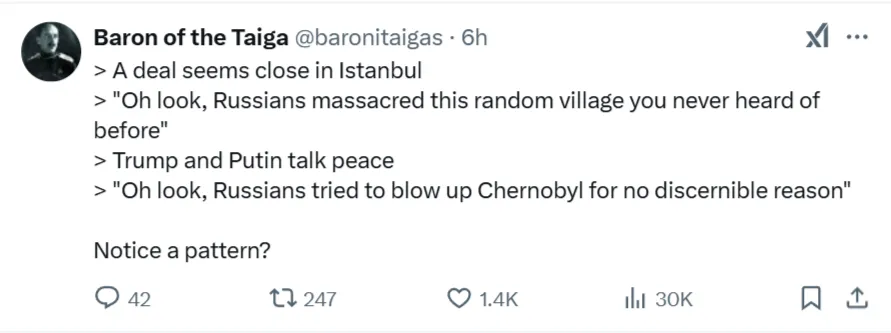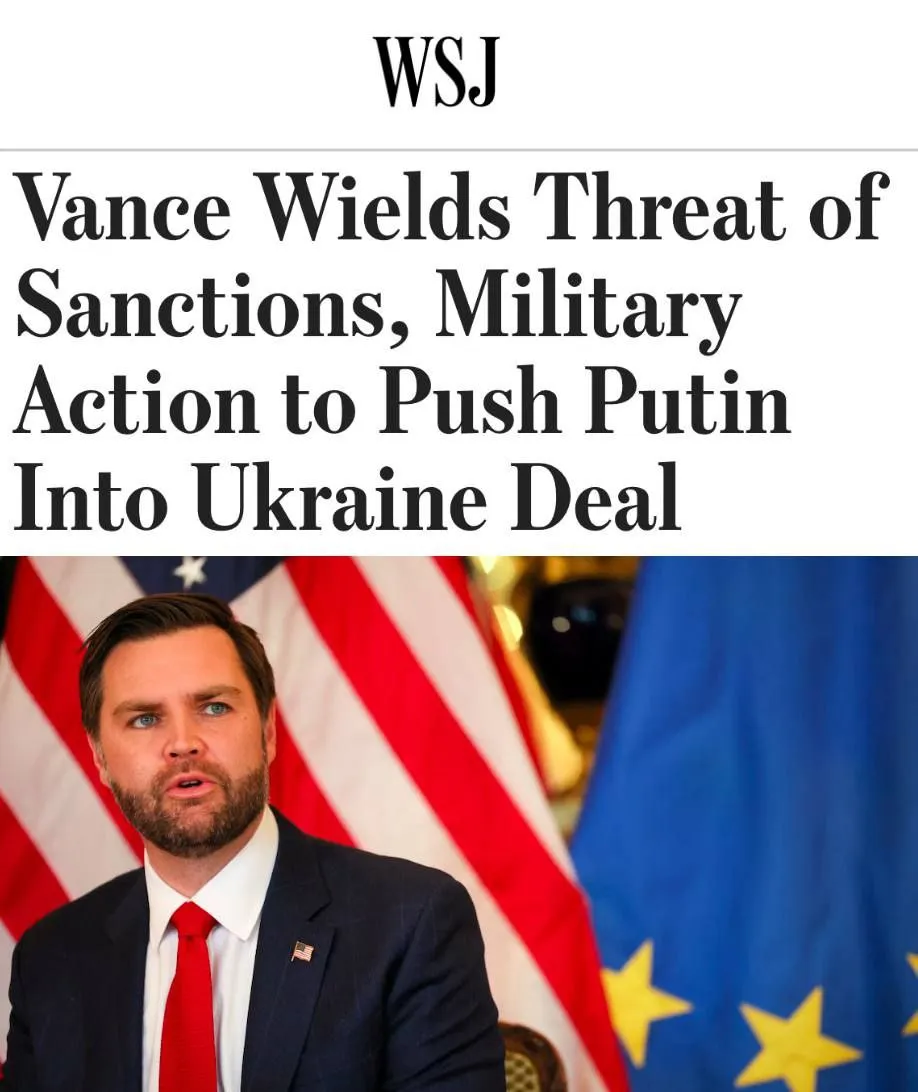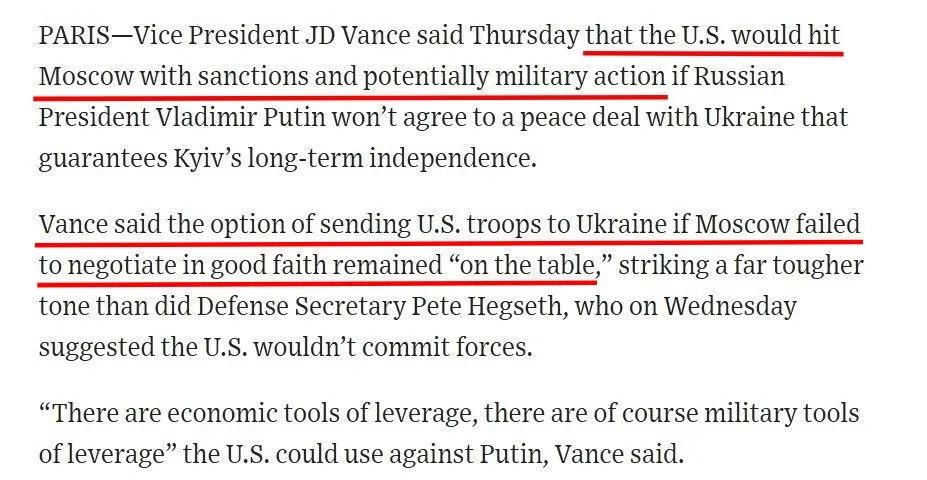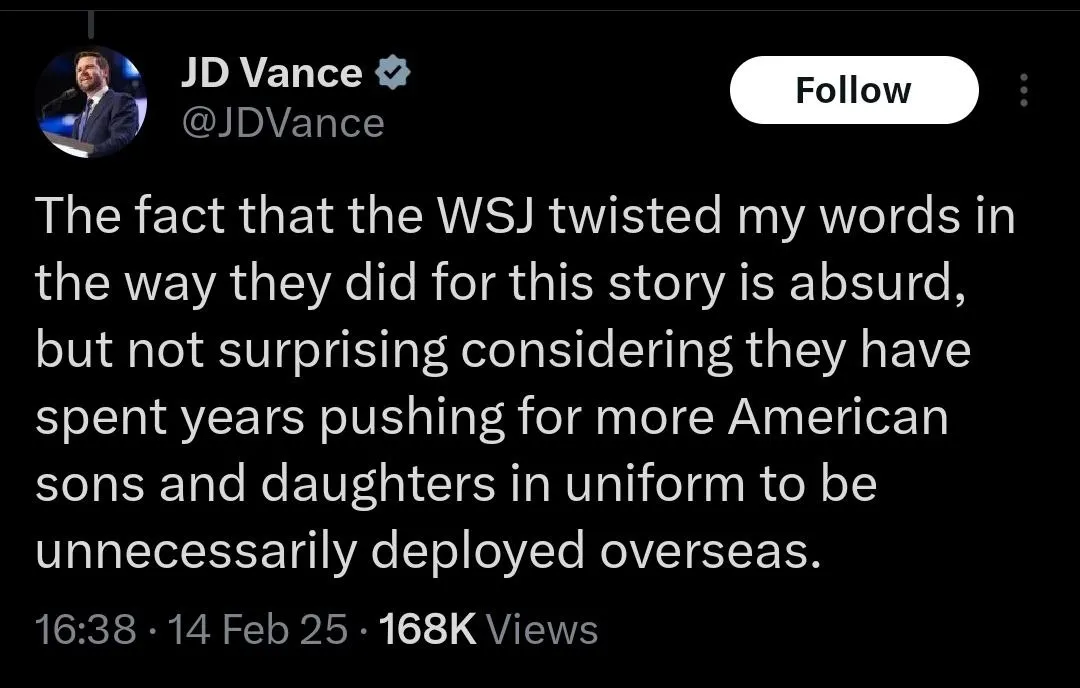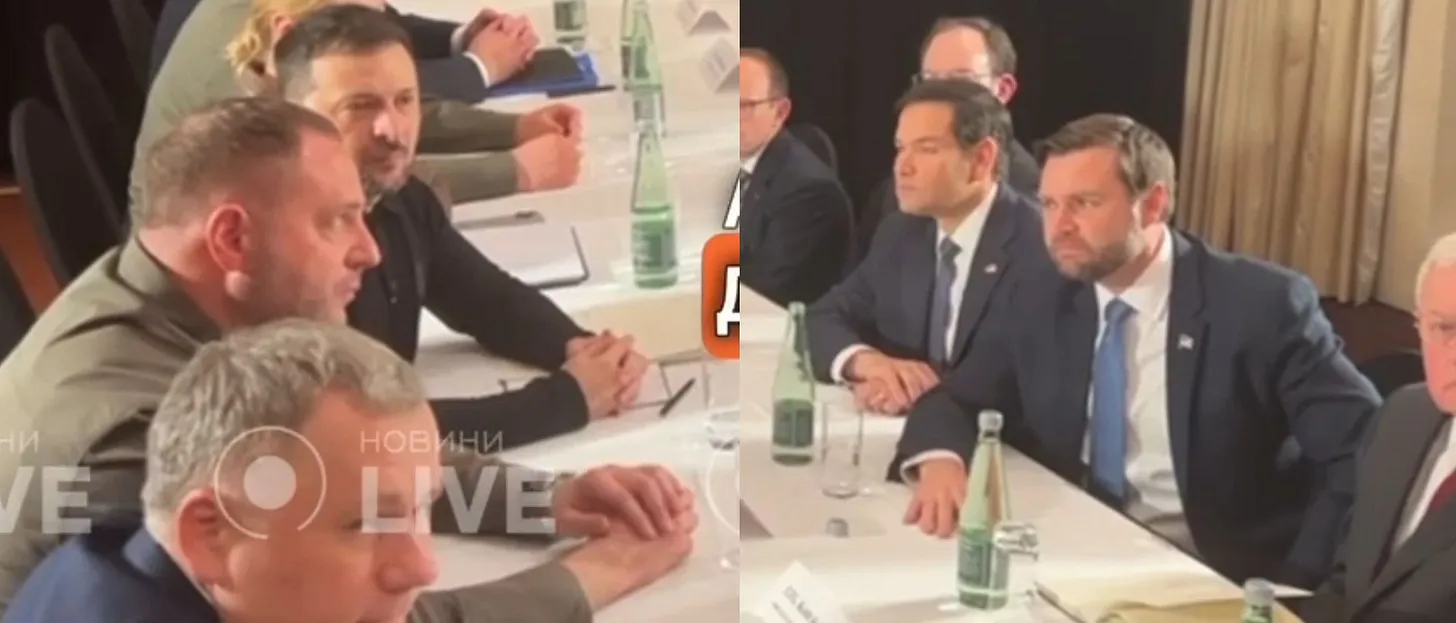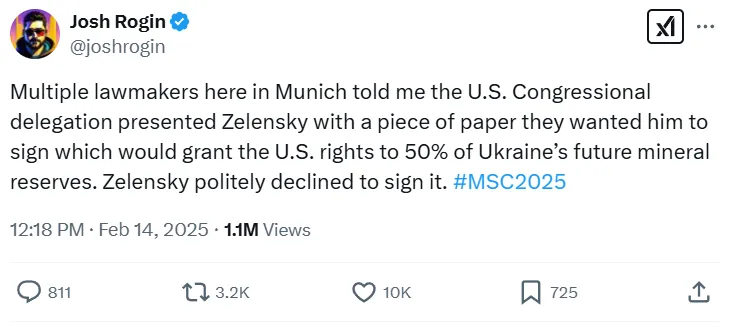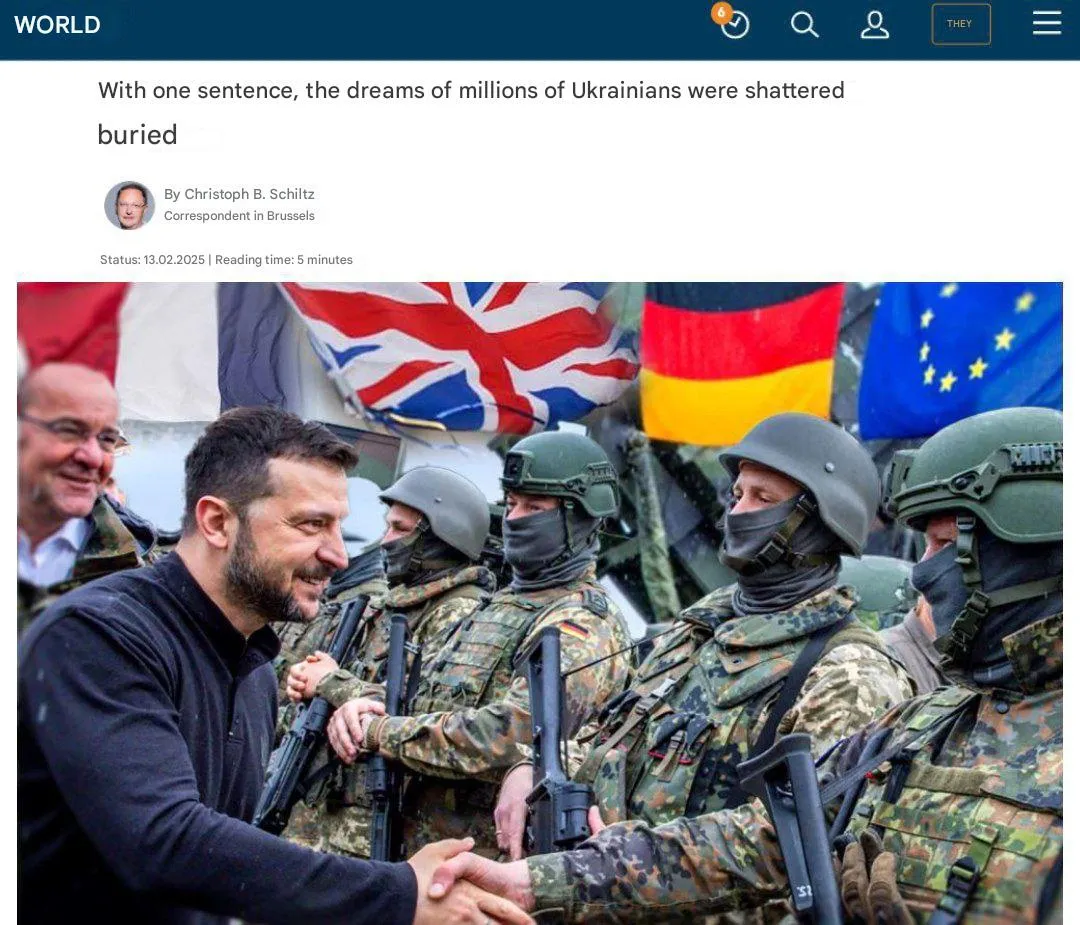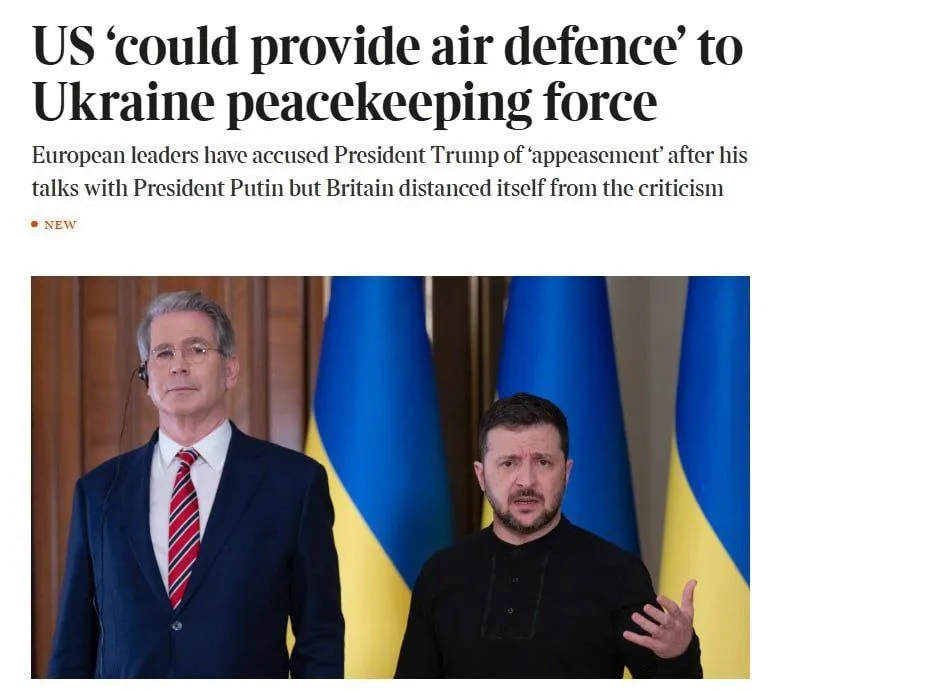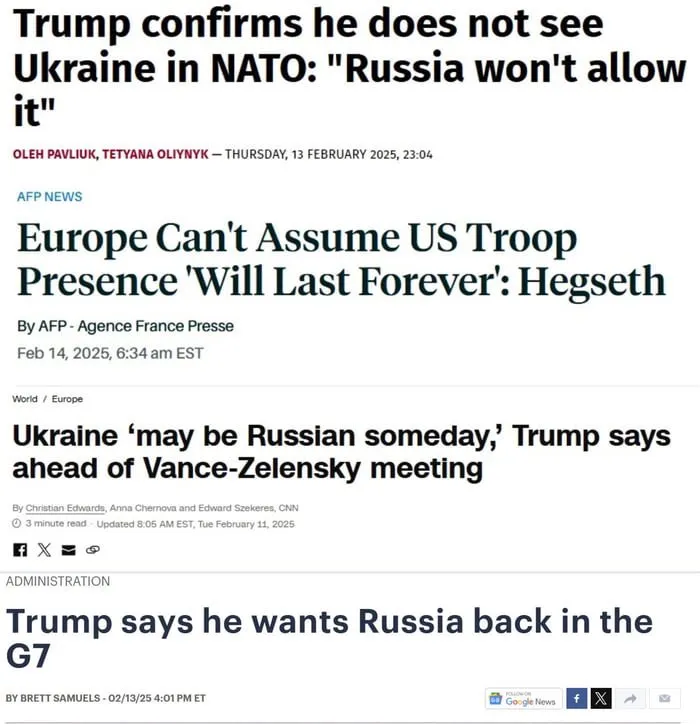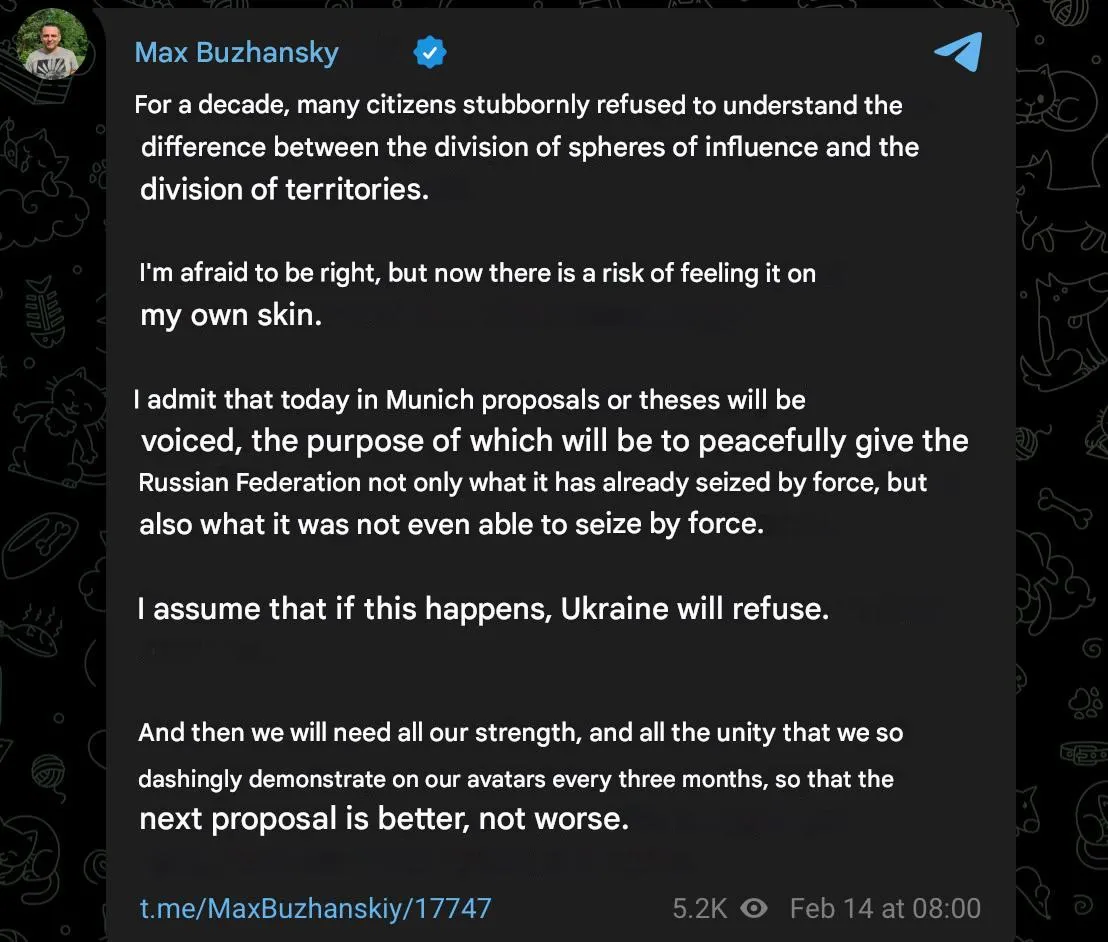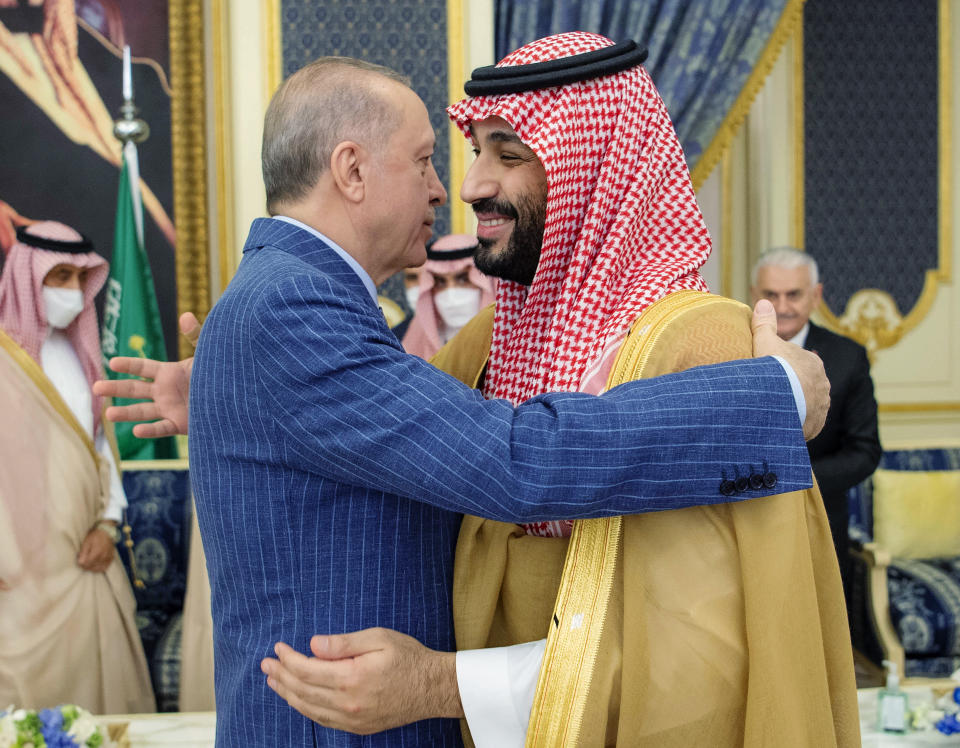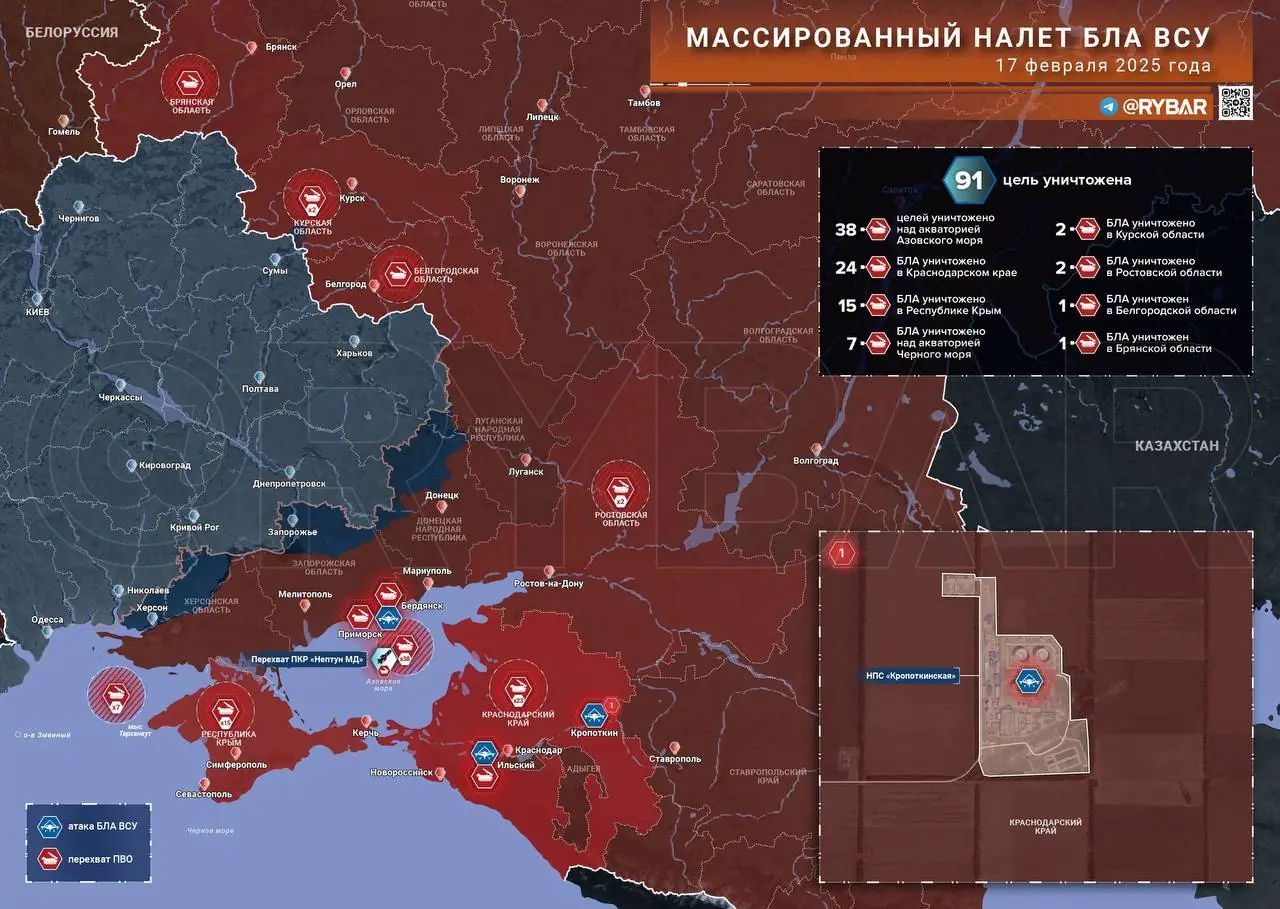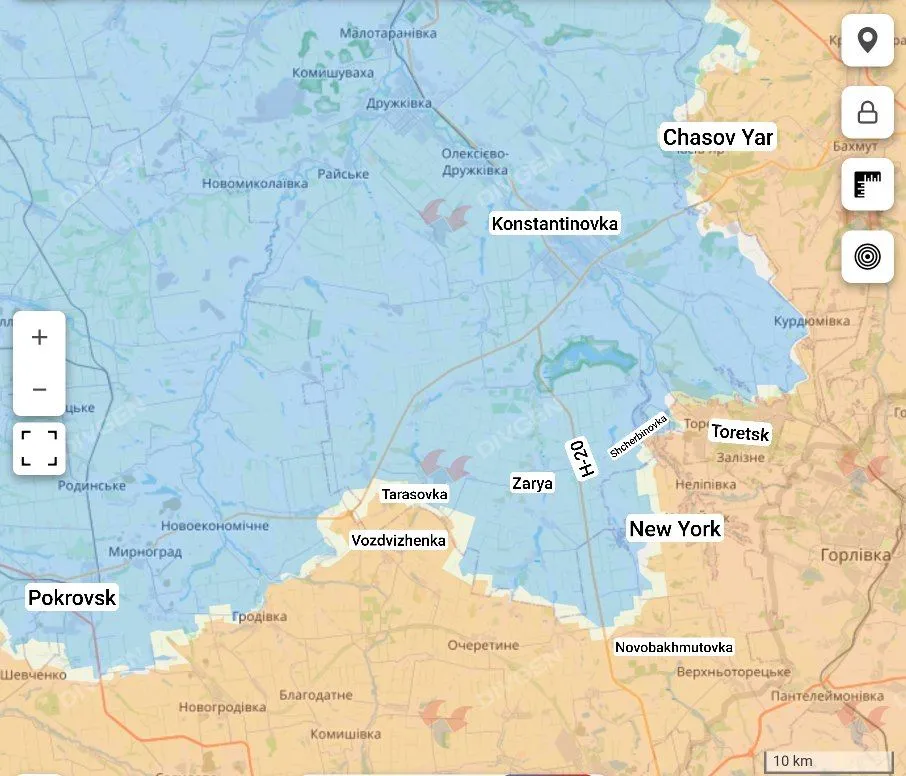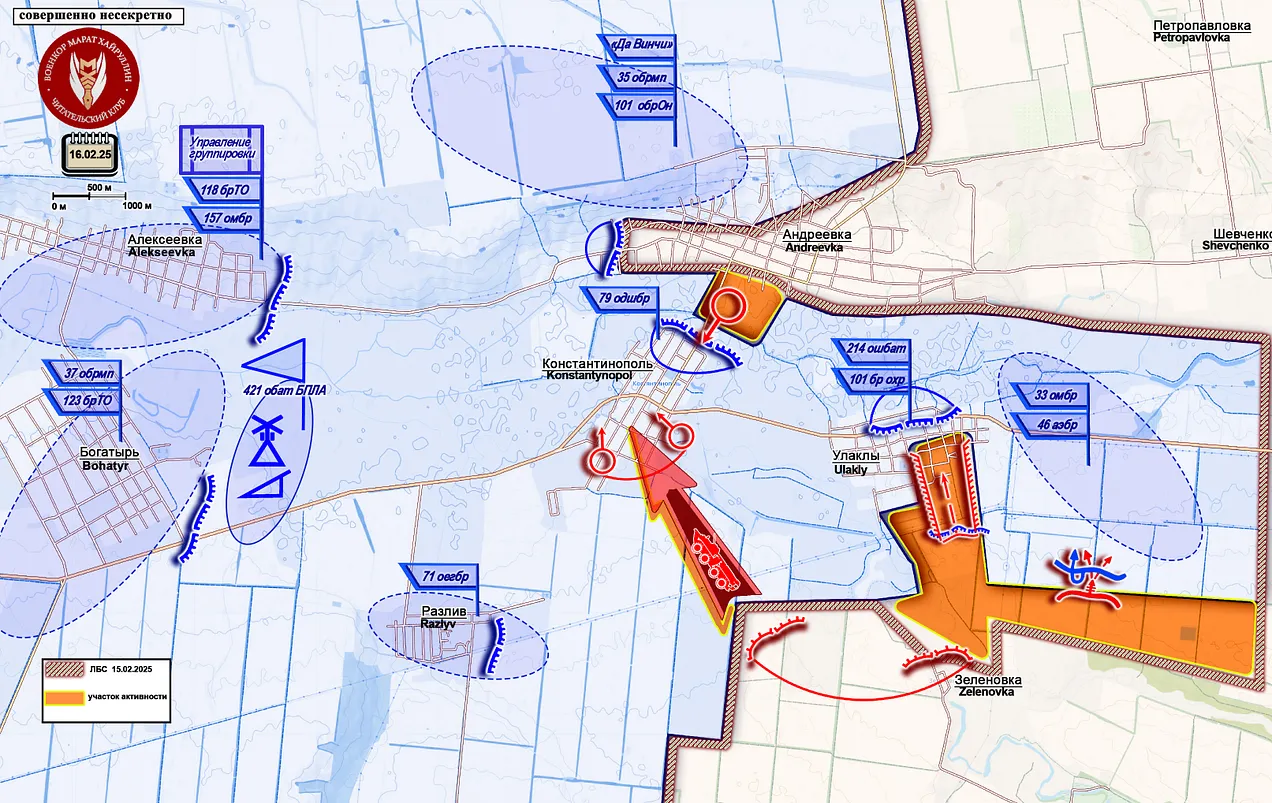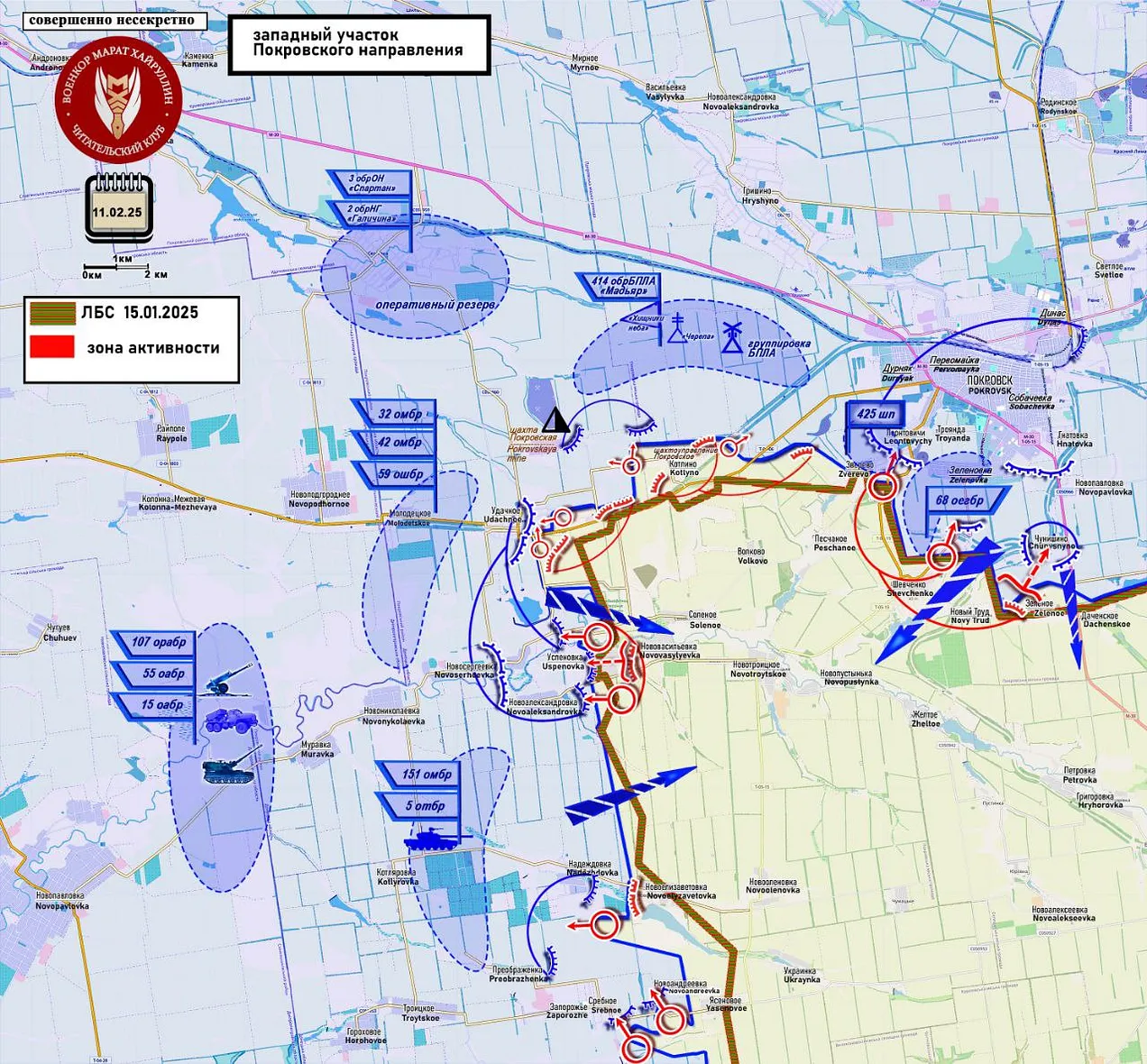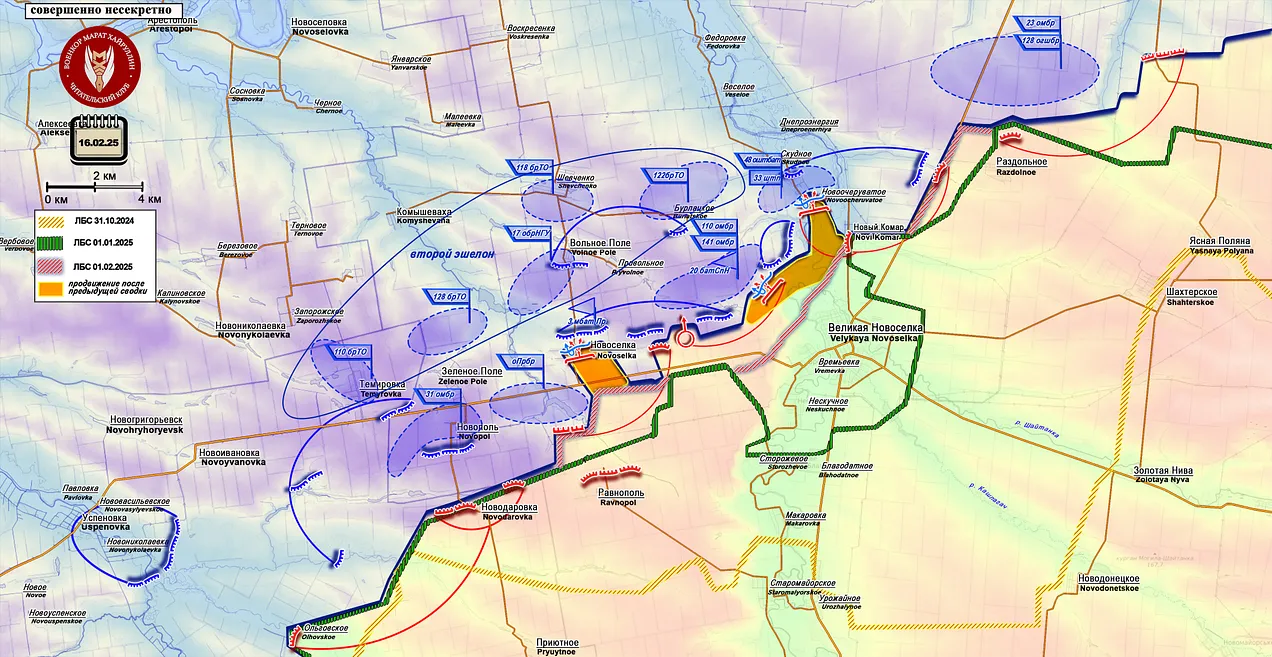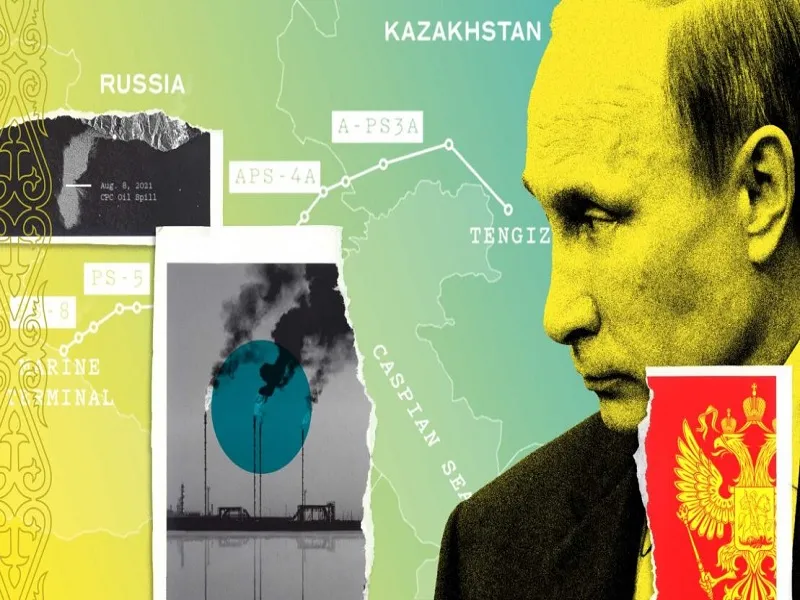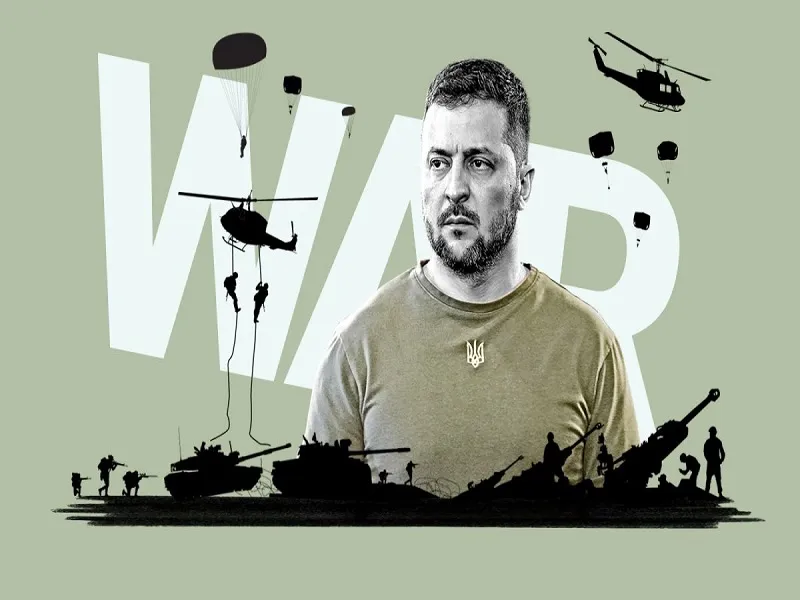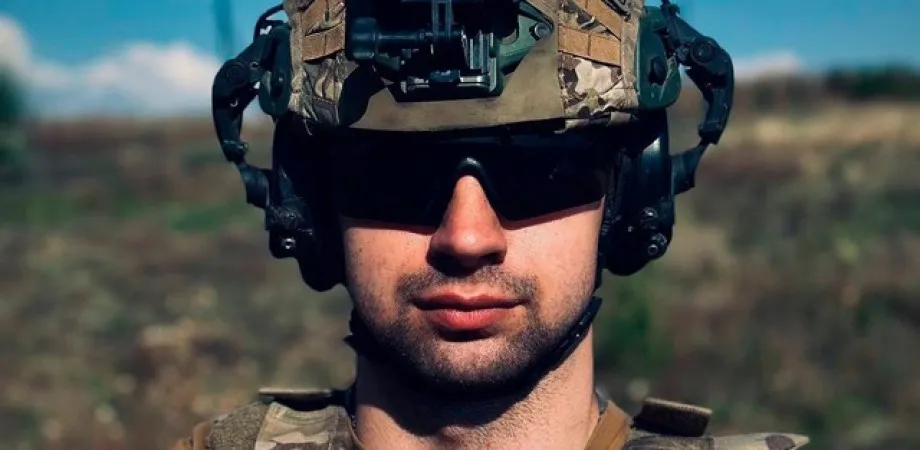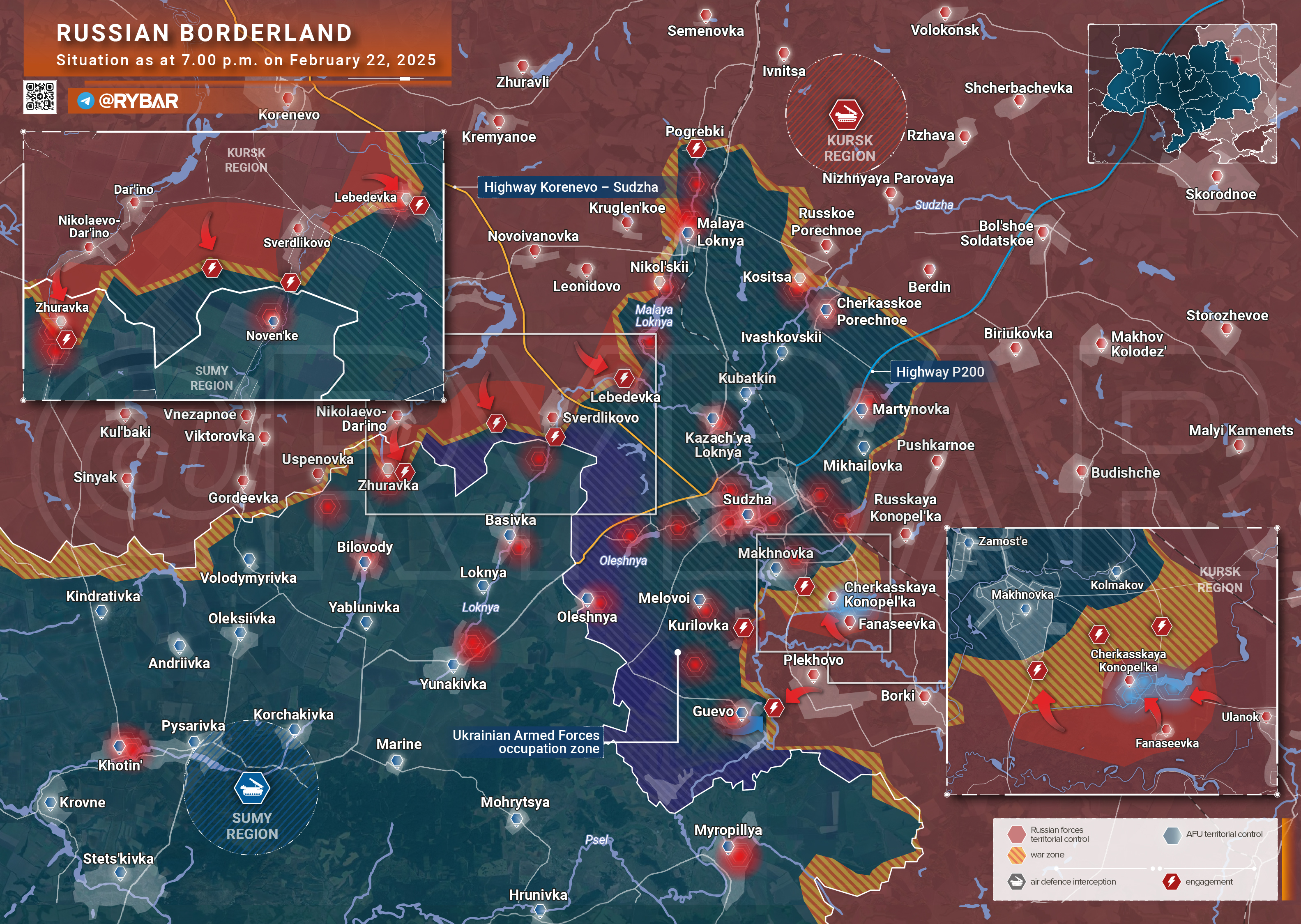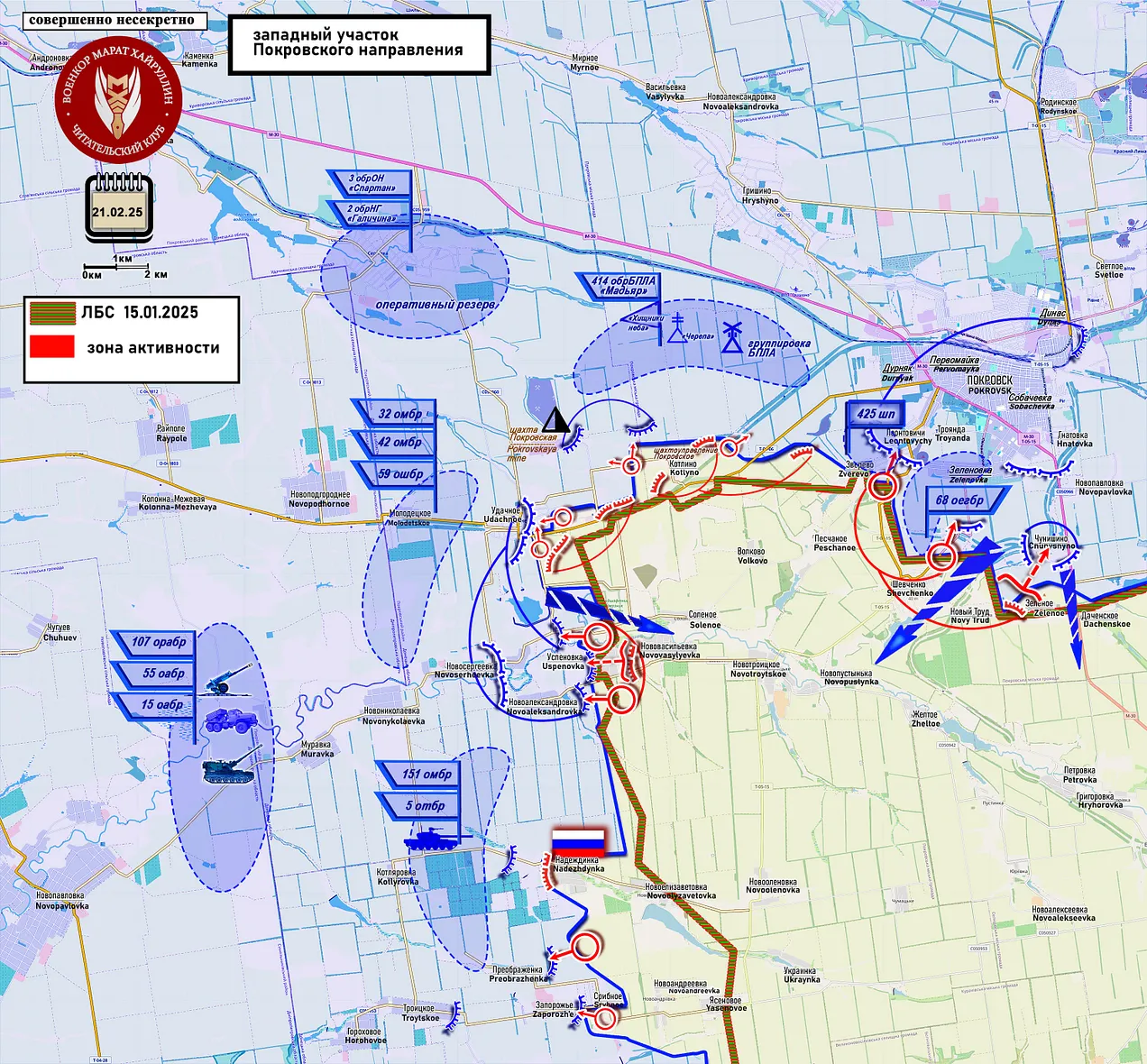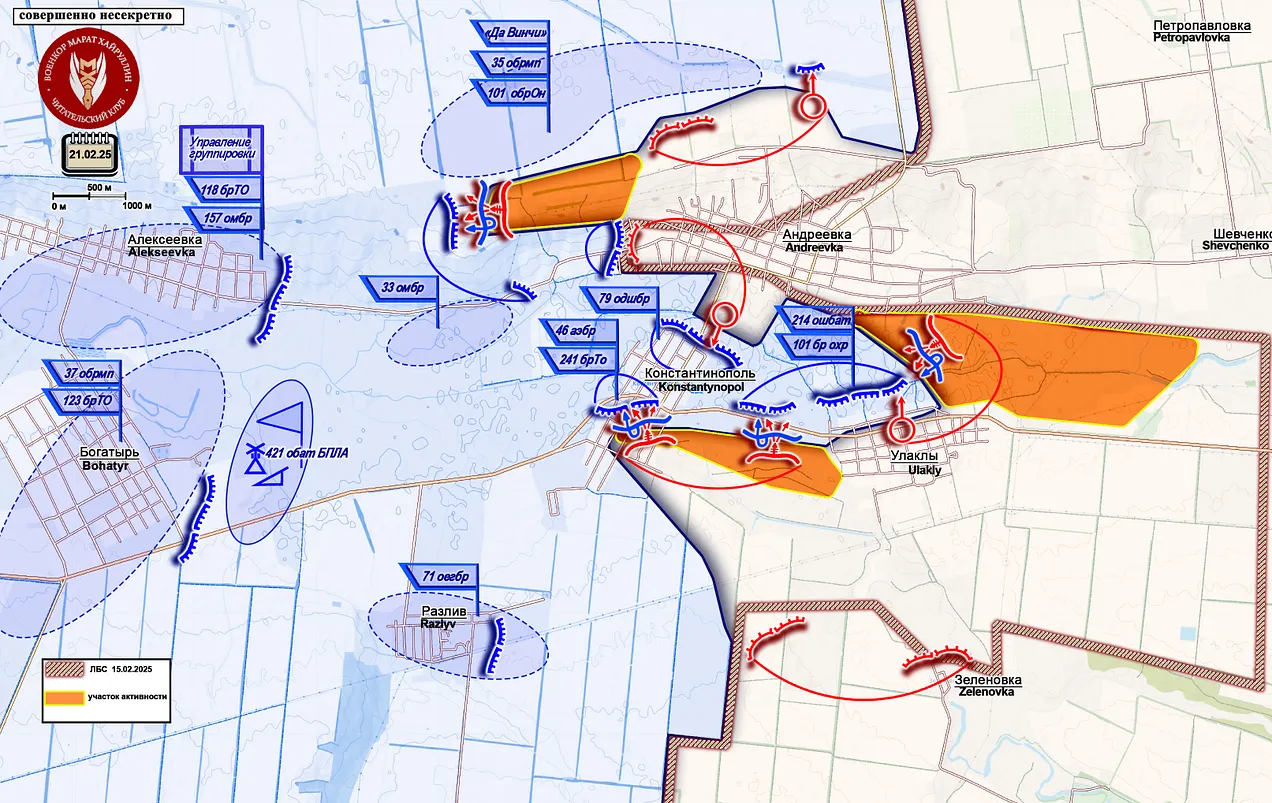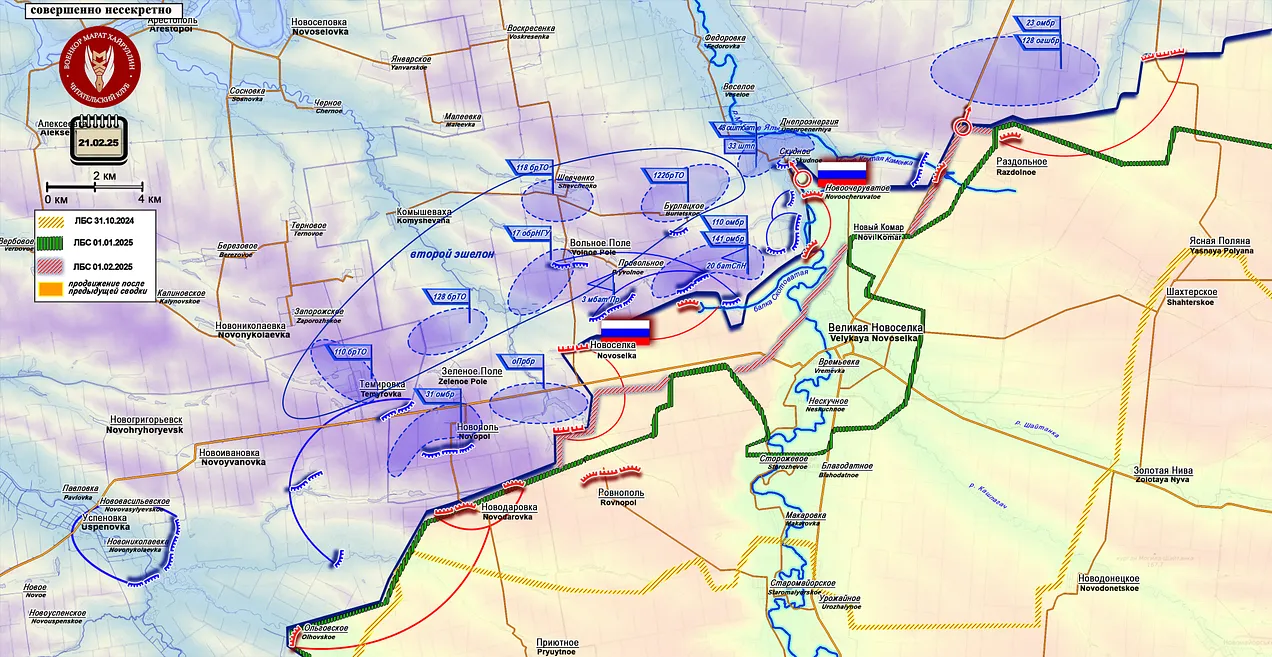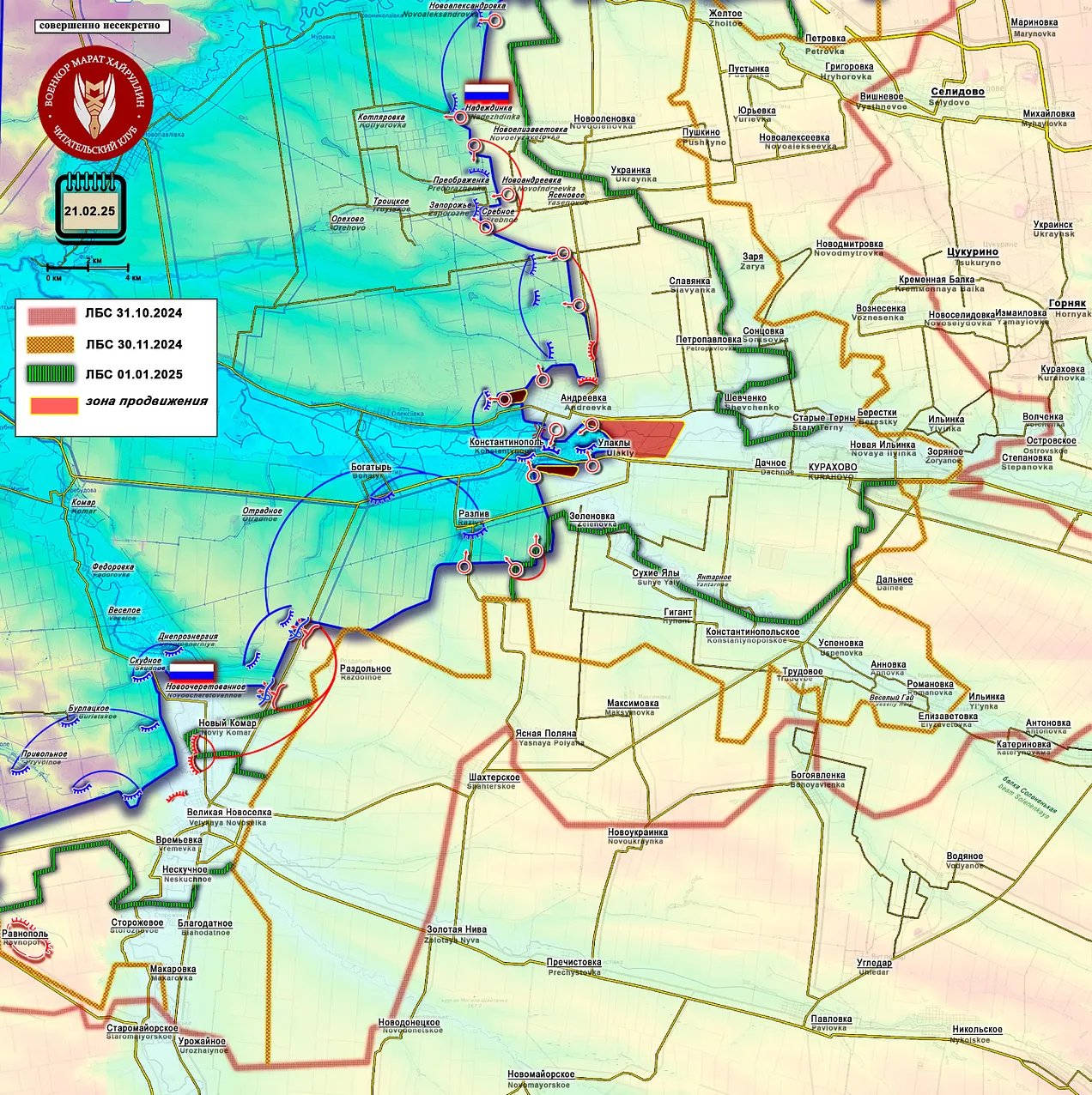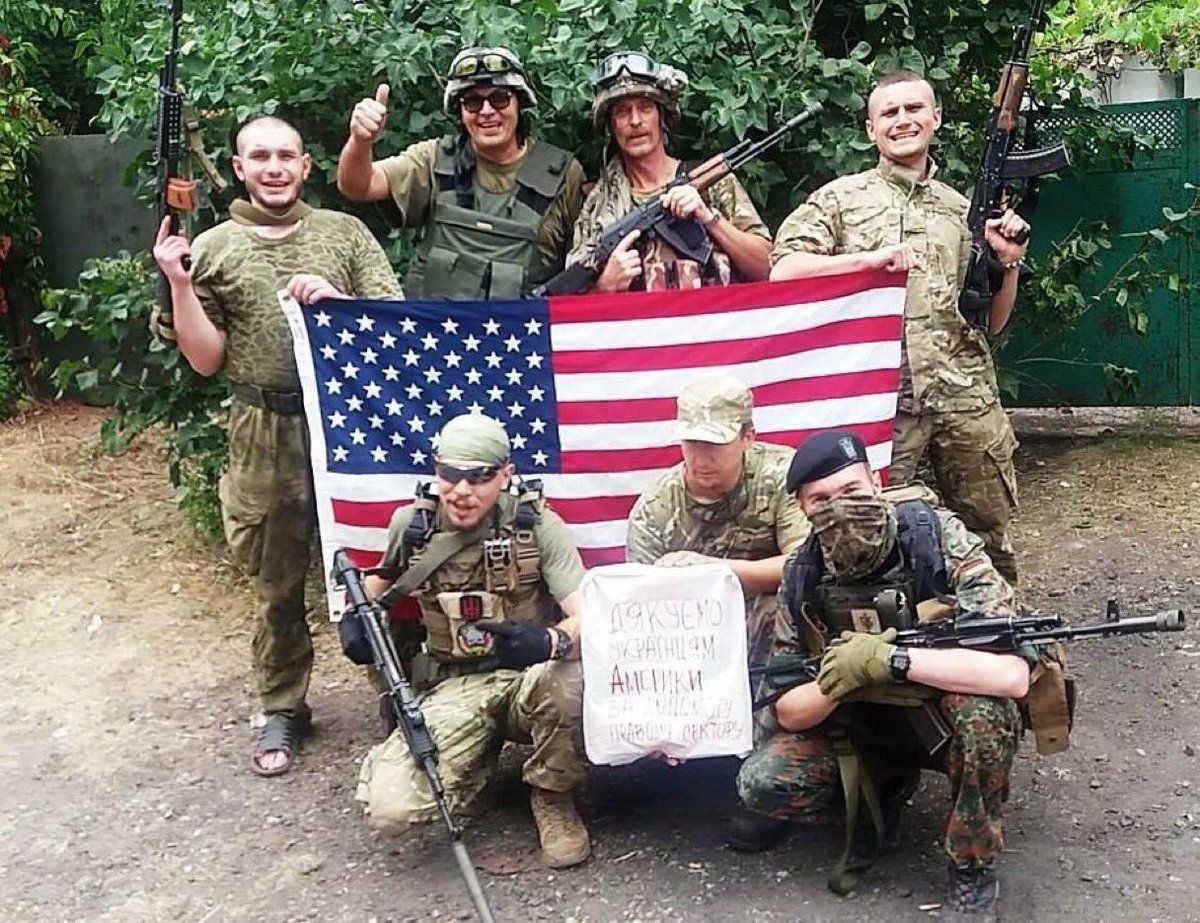Posted by @nsanzo ⋅ 02/15/2025

“One of the first meetings I want to have is with President Xi of China and President Putin of Russia. And I want to say to them: let’s cut our military budget in half,” Donald Trump said, sitting in his presidential chair in the Oval Office, apparently deepening the wound opened hours earlier by Pete Hegseth’s speech to his NATO allies and by the president’s subsequent comments. The Secretary of Defense had stated “without ambiguity” that Ukraine would not obtain in a peace agreement either membership in NATO or the recovery of its territorial integrity, a statement that left the European allies out of the game, who, in addition to demanding that they double military spending, were made clear that they would have to take charge of the “overwhelming majority” of the weapons that have to be sent to Ukraine and of the security guarantees after the ceasefire, including a peace mission in which the United States would not participate and would not be under the umbrella of NATO or its collective security clause. That same evening, Trump struggled to respond to a question from the press about whether Ukraine had a say in the negotiations, referring to a future visit by Vladimir Putin to the United States and adding “while he is there” to a reference to Volodymyr Zelensky, of whom he recalled that “the polls are not going so well, to put it mildly.”
“I am telling our partners very clearly… We will not agree to any bilateral negotiations on Ukraine without us,” an offended Zelensky said on Thursday, after he had notably hardened his initial soft response to the coup in the shadow of the European countries, which was not surprising, even though it was expected – there was nothing in Hegseth’s speech that could not be deduced from the words of Trump during the campaign and his team during his first weeks in office. Yesterday, after Donald Trump announced that there would be a first meeting between the United States, Russia and Ukraine within the framework of the Munich Security Conference, Ukraine excluded itself from the meeting. After a day in which kyiv focused on demanding presence in the entire negotiation process, Zelensky’s team distanced itself from any possibility of opening up to dialogue. In fact, even the organizers of the conference were surprised, since Russia has been excluded since the invasion of Ukraine, so the only Russian citizens at the summit are members of the opposition. Yet Ukraine felt the need to insist on the wrongness of a three-way meeting.
“I believe that the United States is not in a mediating position,” Zelensky said, insisting that in Washington it is “at the top.” Therefore, “it must be on our side because it is Russia that has attacked us. We are right and they are wrong. And here there must be no concessions of any kind.” “A conversation between Putin and Trump is not a danger only for Ukraine, it is a danger for the whole world,” he said yesterday. The negotiation process must be carried out according to the Ukrainian agenda, which once again insists on the hierarchy: “For me, the order of the meeting would be first the United States, then Europe and finally Russia.” Zelensky has made it clear since the presentation of his Peace and Victory plans that the main negotiation will not be with Russia, but with the United States.
In Zelensky’s vision, the European Union would have a place at the table, although always recognizing who is at the top , a position for which European countries and Kaja Kallas have begun to fight since the moment in which the phone call between Donald Trump and Vladimir Putin was seen as the advance of a bilateral agreement, causing premature panic among those who now seek a way to continue defending Ukraine , that is, prolonging a war in which the country continues to lose soldiers and territory. “More than half a dozen senior European officials told the Financial Times that they expected the American president to tell them that they should pay for the reconstruction of Ukraine and deploy troops there to maintain a peace agreement in which they would not participate,” the media stated on Thursday. The European reaction was swift and leaders of the main powers begged, pleaded or demanded a place at a negotiating table that they reject - the Weimar + statement shows that the idea of continuing to fight until Ukraine is in a position of strength remains the priority - and in which they have no decision-making capacity. The day before, Kaja Kallas had openly stated that Ukraine and the European Union would not accept a deal between Russia and the United States that did not involve their participation. As Zelensky has made a point of repeating, the EU does not have the economic and, above all, industrial capacity to compensate for the loss of the United States. This makes European countries a secondary partner to those who are capable of supplying what is necessary for the war and, therefore, are able to dictate when the fighting will end.
“Basically, either we are within the parameters of discussion that will really allow us to bring peace through strength, or, on the contrary, it will be peace through weakness,” said Sébastien Lecornu, France’s defence minister, adding that “peace through weakness could unfortunately lead us to dramatic security situations, or even to the eventual widening of the conflict, without forgetting, of course, the deplorable impact that this could have on other competitors.” Lacking sufficient real opponents, the French officer appealed to the most feared imaginary enemy. “We cannot forget Pyongyang,” he said.
Just two days after the phone call that caused Ukrainian anger and European confusion, the last few hours have produced a series of statements that further complicate the political scenario, especially for those who assumed that the opening to Russia was a sign of a position favourable to Moscow, the threat of abandoning Ukraine to its fate or a renunciation of force as a means to achieve objectives. Just as Ukraine negotiates publicly with the United States demanding security guarantees, NATO membership, missiles to be installed on its territory or funding to double the size of its army to one and a half million troops, Washington also uses its relationship with the two opponents to demand that the other take steps that benefit it. The threat of a negotiation has proven sufficient for Zelensky to open the door to the “joint exploitation” of the country’s mineral wealth, a way of repaying the United States for the assistance provided by compromising the country’s sovereignty and impoverishing its population. In return, Donald Trump and Pete Hegseth have confirmed that funding to Ukraine will continue. The Secretary of Defense has even said that arms supplies could be part of the negotiations, a nod to the Kellogg-Fleitz plan, which made aid to Ukraine conditional on Kiev's acceptance of negotiations and threatened to increase it if Moscow refused to negotiate. Gone is the idea that European countries would be responsible for military supplies for the war.
Consistency has never been the main hallmark of Donald Trump and his team, so it is not surprising that even Hegseth, who tried to be as blunt as possible, has significantly qualified his statements. NATO membership has not been taken off the table, said John Coale, Keith Kellogg's deputy as Trump's envoy to Ukraine. In the words of the Secretary of Defense, NATO membership or the recovery of territorial integrity are "unlikely," although these possibilities are not excluded either. "There are economic tools of influence, there are of course military tools of influence" that the United States could use against Putin, said Vance. "There are a whole series of things we could do. But fundamentally, I think the president wants to have a productive negotiation, both with Putin and with Zelensky," wrote the Wall Street Journal yesterday, reflecting the vice president's statements. Russia, whose press on Thursday was experiencing a wave of optimism similar to the pessimism of the European Union, has already demanded explanations for the statements of the US vice president suggesting the possibility of military action if the negotiations fail.
Even European prayers seem to have yielded some results. According to AFP , Vice President Vance, who dismissed the possibility of meeting Olaf Scholz, assuming he will lose the chancellorship in this month's elections, said that European allies will "of course" be able to be present at the peace negotiations.
Trumpian twists and turns are not new, and they will not cease to be an integral part of Donald Trump's way of governing. He is capable of threatening the People's Republic of Korea with "fire and fury," then organizing a bilateral summit to sign a ready-made agreement and canceling the signing at the meeting place. At this time, when, despite the fears of peace in European countries, the negotiation process has not even begun and Trumpism shows that there is still no elaborate plan to achieve it, the only certainty is that every comment that can be considered favorable to one of the sides must be understood as a way of getting it to come to the negotiating table. The United States is aware that Ukraine, completely dependent on Washington to continue fighting, has no chance of refusing to come to the negotiating table when the United States gives the order to negotiate. Russia, capable of continuing the war and producing the necessary material on its own, is the only party that could need an incentive. This is how mirages such as the idea of halving US military spending, the mention of the possibility of Russia returning to the G8 or the overly blunt statements about Ukraine's Atlantic future should be understood.
https://slavyangrad.es/2025/02/15/banda ... gociacion/
Google Translator
******
From Cassad's Telegram account:
Colonelcassad
🎖🎖🎖 The Russian Defense Ministry on the progress of repelling the attempted invasion of the Ukrainian Armed Forces into the territory of the Russian Federation in the Kursk Region (as of February 15, 2025)
The Armed Forces of the Russian Federation continue to defeat the formations of the Ukrainian Armed Forces in the Kursk Region.
- During offensive actions, units of the North group of forces inflicted defeat on the formations of two tank, heavy mechanized, five mechanized, assault, three airborne assault brigades, a marine brigade, a territorial defense brigade and three assault regiments of the Ukrainian Armed Forces in the areas of the settlements of Viktorovka, Goncharovka, Guevo, Kolmakov, Kositsa, Kubatkin, Kurilovka, Lebedevka, Malaya Loknya, Nikolsky, Sverdlikovo and Sudzha. Three enemy counterattacks were repelled.
- Strikes by operational-tactical, army aviation and artillery fire hit enemy manpower and equipment in the areas of the settlements of Gogolevka, Zamostye, Kazachya Loknya, Loknya, Martynovka, Makhnovka, Melovoy, Nikolaevka, Novaya Sorochina, Oleshnya, Cherkasskoye Porechnoye, as well as Basovka, Belovody, Zhuravka, Obody and Yunakovka in the Sumy region.
Over the past 24 hours, the Ukrainian Armed Forces lost more than 280 servicemen, destroyed four infantry fighting vehicles, an armored personnel carrier , seven armored combat vehicles, 12 cars, two mortars, an electronic warfare station , two bridge layers and four armored repair and recovery vehicles, including two Bergepanzer 2 armored recovery vehicles made in Germany, as well as three UAV control posts.
- In total, during the military operations in the Kursk direction, the enemy lost more than 60,780 servicemen, 363 tanks, 268 infantry fighting vehicles, 216 armored personnel carriers, 1,879 armored combat vehicles, 1,986 cars, 439 artillery pieces, 48 multiple launch rocket system launchers, including 13 HIMARS and six MLRS made in the USA, 21 anti-aircraft missile launchers, eight transport and loading vehicles, 109 electronic warfare stations , 15 counter-battery radars, six air defense radars, 48 units of engineering and other equipment, including 18 engineering obstacle clearance vehicles, onea UR-77 mine clearing unit , five bridge layers, an engineering reconnaissance vehicle, as well as fourteen armored repair and recovery vehicles and a command and staff vehicle .
The operation to destroy the Ukrainian Armed Forces formations continues.
***
Colonelcassad
Summary of the Ministry of Defense of the Russian Federation on the progress of the special military operation (as of February 15, 2025 ). Key points:
- The Russian Armed Forces hit airfield infrastructure facilities and UAV launch preparation sites of the Ukrainian Armed Forces
- Fighters of the North and Dnepr groups destroyed up to 100 Ukrainian servicemen in one day;
- The Russian Air Defense shot down two Hammer missiles, three HIMARS projectiles and 130 UAVs in one day;
- The Ukrainian Armed Forces lost up to 185 servicemen in one day in the area of responsibility of the West group;
- The Ukrainian Armed Forces lost up to 205 servicemen in one day in the area of responsibility of the South group;
- The Ukrainian Armed Forces lost up to 150 servicemen, a tank and 3 armored vehicles in the area of the East group.
The Ukrainian Armed Forces lost up to 150 servicemen, a tank , three combat armored vehicles, three cars, four field artillery guns, including two Western-made ones. Two field ammunition depots were destroyed .
The Ukrainian Armed Forces lost up to 50 servicemen, nine vehicles and an electronic warfare station .
https://t.me/s/boris_rozhin
Google Translator
******

Ukraine’s Battlefront Collapse, Zelenskiy v. Zaluzhniy 2.0, and a Split of the Maidan Regime?
by Gordonhahn
February 13, 2025
As Ukraine’s frontline defense collapses and its army retreats and cracks under the persistent pressure of Russia’s mounting offensive and territorial advance, its Maidan regime is coming under increasing pressures. Early splitting of the regime seems to starting, though all this remains still barely visible. Thus, a regime split – that is, a split among the ruling elite, groups, and institutions appears perhaos to be slowly developing over the issue of war and peace. Regime splits tend to be precursors to regime even state collapse, coups, and revolutions. War, especially defeat in war, often is the cause or a main cause of such regime transformations. Besides Ukraine’s ongoing military defeat, there are the collapse of the war effort, additional destabilizing pressures on the regime and state include economic and social dislocation, the narrowing of the Maidan regime’s political base as a result of President Volodomyr Zelenskiy’s increasingly authoritarian policies at home, and Ukraine’s growing dependence on foreign states (supposedly to ensure Ukraine’s survival) that drag out the catastrophic bloody war rather than provide Kiev with the means for victory or build an off-ramp to Moscow and an end to the conflict destroying the country.
Thus, signs of an emerging regime split or at least significant cracks in the Zelenskiy iteration of the Maidan regime are beginning to emerge, centering around former commander of Ukraine’s armed forces, Gen. Valeriy Zaluzhniy, fired by Zelenskiy earlier this year (https://ctrana.news/news/459385-opros-o ... ltaty.html). If a Ukrainian ‘government-in-exile’ will be needed somewhere likely in the not too distant future, then the logical candidate to head it is Zaluzhniy, who now ensconced in London as Ukrainian’s ambassador to that staunchly anti-Russian country, and the set of such a ‘government’ would logically become London.
Zelenskiy has repeated often his rejection of Sino-Brazilian peace plan and other proposals, noting that they do not meet his requirement that Russia must withdraw its troops back behind Ukraine’s 1991 borders. But Zaluzhniy put in his rather contrary two cents, and the value of that ‘two cents’ is high as the general happens to be Ukraine’s most popular political and military figure (https://ctrana.news/news/459385-opros-o ... ltaty.html). Now Ukraine’s ambassador to London, Zaluzhniy recently softened his position in contradistinction to that of Zelenskiy’s ‘Victory Plan’ and repeated statements that Ukraine will fight until it returns all its territories as they existed as of 1991. The UK’s Telegraph reported “Asked in London on Thursday if he could imagine a victory without getting all the lost territory back, he said: ‘I didn’t mention territories. I mentioned safety, security, and the feeling of being in one’s own home. For me personally, as Valery Zaluzhny, if I lived in my house and was aware my neighbour took a part of my garden, I’d say we need to resolve this. If not now, then your sons would have to resolve the issue‘” (www.telegraph.co.uk/world-news/2024/10/ ... pe-defeat/ and https://kyivindependent.com/zaluzhnyi-protracted-war/). This suggests a willingness to entertain the idea of ending the fighting if only under the guise or intention of returning to the issue by military or diplomatic means later on. Zaluzhniy has also distanced himself from Zelenskiy’s Kursk incursion disaster, criticising it as mistaken in a widely publicised comment. As Ukrainian forces in that Russian region face encirclement and annihilation, reality is about to post another win for the general and another flop for the tragic ex-comic.
Active Ukrainian military officers and regular soldiers also have begun to express a more flexible position on talks and compromise with Moscow (as has Ukrainian public opinion). Zaluzhniy’s opinion may strengthen the peace camp’s numbers. At the same time that some in the Ukrainian army seem prepared for talks and even territorial compromises, this is far from true of the fiercest of them all and thus have paid perhaps the highest price in the war, the neofascists of Azov, Right Sector, the Volunteer Ukrainian Corps, and others, as one mainstream media article contends. Hence, the military may split as well, as some support peace talks with other military seeing this as treason. Zaluzhniy might be the only figure who could persuade some oft he hawks to put off their revenge-taking for some time, as he has been noticably close to Right Sector, evidenced by among other things his appointment of its founder, Dmitro Yarosh, as an advisor and after the war began as a liaison with military medical assistance units. Yarosh is a situational supporter of Zelenskiy and the Maidan regime but repeatedly insists that the completion of a real nationalist (read: ultra-nationalist/neofascist) revolution is yet to come (www.facebook.com/dyastrub/posts/pfbid07 ... REvyiNgvil).Or would Zaluzhniy ‚pull a Zelenskiy‘ and come to power promising peace only to hand greater power to the radicals and hawks and continue the war?
Another signal of likely regime splitting is the recent firing of Ukraine’s General Prosecutor Aleksey Kostin. The official claim is that Kostin was held responsoible for a corruption scheme among lower level prosecutors to acquire passes from military service (https://ctrana.news/news/474025-v-khmel ... ostju.html; https://www.euronews.com/my-europe/2024 ... ng-scandal; and https://ctrana.news/news/473967-vechern ... -2024.html). However, accusations on other scores had been addressed against Kostin ever since Zaluzhniy’s removal in February, and Kostin was rumored to be in danger of being fired at that time as well. Kostin‘s ultimate firing may have occurred for refusal to investigate further or draw up charges against Zaluzhniy, who before his removal was being investigated for treason and regarding whom there have been recent rumors of new investigations (https://ctrana.news/news/459608-pochemu ... done-.html).
At the same time, the increasingly powerful Head of Zelenskiy’s Office of the President, Andriy Yermak offered a somewhat different path in an interview to the Italian newspaper Corriere Della Sera. He said talks cannot begin until Russia withdraws it troops to where they stood before the beginning of Russia’s ‘special military operation’ (SMO) on 24 February 2022. Then, he claimed, it could be decided how Ukraine would return to its 1991 territorial borders, but this would require Ukraine possessing leverage such as a superior position on the battlefield and/or a shift in the position of the ‘global South’ in favor of Ukraine (www.corriere.it/esteri/24_ottobre_27/ye ... dxlk.shtml and http://www.pravda.com.ua/eng/news/2024/10/27/7481612/). Yermak’s amendment to Ukraine’s official position seems small but creates wiggle room for agreement to begin peace talks. His formula implies that Russia would not necessarily or at all be required under any future agreement to give up its presently self-declared sovereignty and near full occupation of the regions of Donetsk, Luhansk, Zaporozhe, Kherson, and Crimea. Once negotiations are engaged and leverage does not materialize, Zelenskiy can be removed, perhaps with an amenable US administration’s support.
Zelenskiy’s tendency to misplace reality is certainly one driver pushing some in his inner circle to separate themselves from their delusional president, and one of those who might break from him is Yermak. Last month Zelenskiy threatened that Kiev would develop nuclear weapons if his ‘Victory Plan’ demand of immediate accession to NATO was not granted. Kiev was left to scramble to deny this in an embarassment that had to have further discredited the increasingly desperate and floundering Zelenskiy in the eyes of many in and out of power in Ukraine (www.pravda.com.ua/rus/news/2024/10/17/7480187/). The NATO Gen Sec and other Werstern officials rejected immediate Ukrainian membership, and NATO even publicized the stipulation that before Ukraine could ever jopin NATO the former’s borders would have to be fully demarcated – an impossibility in wartime and Russian occupation of much of the border (https://ctrana.news/news/473674-ukraina ... anits.html). Thus, Zelenskiy had to back off on his Victory Plan’s immediate NATO membership clause (https://ctrana.news/news/474297-zelensk ... nstvo.html). Almost equally absurd was a secret protocol in his Victory Plan mandating the West supply Ukraine with US 2400 km. long-range Tomahawk missiles to hit targets across the Russian landscape. Then the leak to the New York Times about this secret clause further embarassed Zelenskiy publicly. He soon acknowledged the veracity of the NYT report and naturally reacted sharply to his becoming the latest victim of DC‘s promiscuous leak culture (https://ctrana.news/news/474382-zelensk ... havki.html and www.nytimes.com/2024/10/29/world/europe ... a-war.html). Zelenskiy’s increasing foolishness, manifested in his unrealistic demands and incautious brinkmanship, along with his declining relations with the West are further undermining him at home.In lieu of elections, a softening of Zelenskiy’s war time authoritarian regime, or a general breakdown of the state, army and/or society, the only path out of the Zelenskiy knot for Ukraine is a regime split and the emergence of an authoritative figure to lead the regime-defectors – whether doves or nationalist hawks – against Zelenskiy’s ruling cohort. The only person fitting that bill at present is Zaluzhniy. Defectors from Zelenskiy could create an alliance led by one or more of those mentioned herein — Zaluzhniy and/or Yermak — and/or former President Petro Poroshenko, prosecuted and forced to flee Ukraine by Zelenskiy.
As the front and army continue to crumble, as Ukraine goes through a rough winter of blackouts, shortages of heat, and mounting battlefield defeats, and as Russian forces approach the Dnieper River, dissenting voices in the bifurcating pressure cooker that is Kiev could well call upon or be rallied by Zaluzhniy to act for the sake of the country’s salvation, disregarding the different factions’ preferences for continued war – partisan or otherwise – or a newfound peace.
https://gordonhahn.com/2025/02/13/ukrai ... an-regime/
******
Initial Thoughts on US-Russia Talks on Ukraine War as Ukraine and EU Have Nervous Breakdowns
Posted on February 13, 2025 by Yves Smith
Trump’s announcement of talks “immediately” between the US and Russia over Ukraine after a 90 minute call with Putin, shocked Ukraine and Europe despite Trump’s outstanding promise to end the war in 24 hours when he took office. European leaders got a second gut-punch in Pete Hegseth’s statement that the US had heard Russia’s demand that it would not agree to a settlement unless Ukraine really really was not going to enter NATO:
BREAKING:
- Ukraine won't be a member of NATO
- No return to pre-2014 borders
- U.S. will not send troops in Ukraine
- No more relying on the U.S.…
European, UK, and above all Ukraine leaders should not be surprised at this development. There’s no appetite in this Administration or Congress to pour more arms and treasure into the war; Trump’s talk of mortgaging Ukraine mineral wealth (when pretty much all of it already has owners and/or is in Russian control) looked more like yet another dominance game of Trump’s versus Zelensky to remind him of his dependence on US largesse, as well as a ham-handed effort to pretend to Russia that the US conceivably has a politically acceptable way to keep funding Ukraine.
However, the flip side is many commentators have been reduced to frequent use of the word “delusion” to depict the European/Ukrainian grip on the trajectory of the war. The Collective West ex the US seems to be in the state of someone who has been seriously unwell and has gotten bad blood test readings, but is still somehow unprepared when imaging comes back telling him he has Stage 4 cancer. And that’s charitable. It’s hard to see Ukraine’s five year survival odds as being as high as 20%.
Since this is, as Lambert is wont to say, an overly dynamic situation, we’ll make a few observations that, as far as we can tell, seem to be sound but we don’t yet see in circulation. We’ll then turn to the UK/Europe/Ukraine meltdown and their insistence on crashing the negotiation party.
We’ll also return to the Article 51 issue Hegseth raised in the form of a clarification and correction from Auerlien via e-mail. We’ll also take a brief look at UK/European reactions.
Initial Thoughts
These developments will deliver a severe blow to what is left of Ukraine morale, most importantly among its military. One can expect an increase surrenders/running away. It will also make already difficult recruitment even harder.
That should result in reports of even more breakdowns on the front lines and corresponding increases in the speed and/or breadth of Russian advances.
Putin may not want to look like he is poking a stick in Trump’s eye via looking like he is increasing the tempo in order to step up pressure. Russia still has to take and clear Slaviansk and Karamatorsk, for instance. Operations like that would be less embarrassing to Trump than marching to the Dnieper if/when becomes possible.
Despite yet another Trump “shock and awe” show, Trump needs Ukraine and European cooperation unless he is willing to walk away. Trump is now taking the contradictory position that he wants to end US funding yet still push the other NATO members around by not merely acquiescing to a deal they detest, but also committing substantial resources to it while the US stands aside. This is a violation of the golden rule: “He who has the gold makes the rules.”
Note also that Hegseth’s “You are on your own” regarding security guarantees may not be as black and white as it sounds. Hegseth said no to ground forces, which leaves open the possibility of US air support.
And as we’ll discuss more below, from news stories, UK and European leadership are incandescent over the idea that the US and Russia are negotiating the end of the war without them. A preview from Colonel Smithers via e-mail:
On the way to Oxford this morning, I listened to the Today programme on BBC Radio 4. It was deranged, if not infuriating.
And Aurelien’s reply:
I read as much as I could bear to this morning of the hysterics of European leaders. As a number of us have been saying for a while, this is not a case of the US driving reluctant European puppets forward: the visceral hatred of Russia is stronger over here than over there, and could result in a really nasty showdown across the Atlantic
Ukraine has agency and Ukraine is not even remotely on board. Despite Ukraine running out of men and weapons, it is still fighting. Remember that possession is 9/10 of the law. Despite the close to certain outcome of an eventual Russian win, in that scenario. Russia is faced with continuing to bleed and shell Ukraine until it surrenders and/or its military really does collapse. In that scenario, Russia also bears the burden of occupying and administering Ukraine as well as rebuilding it.
Putin, despite being willing to talk to the US, has made clear that if Ukraine survives in some form, it needs to make its own commitment to no NATO membership as well as neutrality, preferably enshrined in its constitution. But as Putin has repeatedly pointed out, Zelensky signed a degree in October 2022 barring negotiations with Russia as long as Putin was in charge. Putin says the Russian reading of Ukraine’s constitution is that Zelensky, by virtue of his presidential term having expired, cannot take any binding acts on behalf of the Ukraine government, which would include reversing the decree, which Putin deems to be necessary to start any meaningful discussions with Ukraine.
In other words, clearing up the legitimacy of rule in Ukraine is on the critical path to concluding any deal. Putin has suggested that the Russian reading is the head of the Rada has constitutional authority to act under martial law when the President’s term has expired, but as far as I can tell, no one in Ukraine has been willing to endorse that idea.
So the presumed fallback is Ukraine will have to hold elections. Zelensky has already deemed that to be impossible. His latest argument:
Zelensky says all Ukrainians are against elections, because they know what will happen
He thinks Ukraine would LOSE its army and be forced to 'suspend' the conflict
In a sign of continuing resolve, Zelensky just sanctioned and froze the assets of the most plausible pretender to his throne, former president Petro Poroshenko. And with Musk just having killed the USAID foreign propaganda/protest machinery, the US has little ability to influence election outcomes. From Reuters:
Ukraine has imposed sanctions on former president and opposition politician Petro Poroshenko, including asset freezes and a ban on withdrawing capital from the country, a presidential decree published on Thursday said….
The decree did not say why the sanctions were imposed, but Zelenskiy said earlier that his security council would announce sanctions targeting people who had undermined Ukrainian national security.
“The billions made in what amounted to the sale of Ukraine and Ukrainian interests and Ukrainian security must be blocked and made to work for the protection of Ukraine and Ukrainians,” he said.
And what of the Banderites? They still wield disproportionate influence in Ukraine, if nothing else due to their abandon and glee in reporting to extreme violence. Yet their sell-by date is coming soon.
Do they hold fast to their weird eschatological tendencies and dig in and keep fighting? They can expect Russian war crimes trial unless they run away to say the Baltic states, Canada or London. If they stay, unless Zelensky finds a way to flee, he is effectively their hostage (Scott Ritter and other believe that Zelensky’s personal security forces have a significant Banderite participation). Remember, per above he’s useful to hold up elections to then thwart Ukraine signing any final deal.
Aurelien on the Trump Team’s confused thinking on Article 51 and peacekeeping. I am sure Aurelien would have weighed in on his excellent site, but he publishes on Wednesdays, and the news of the planned negotiations broke shortly thereafter. I’m sure he will have plenty to say next week, particularly since we’ll have a better grip on facts v. rumors v. posturing. In the meantime, we are very grateful for this input via e-mail:
You may want to comment on Hegseth’s remarks about European forces sent to Ukraine
“not having Article 5 protection.”
I’m not sure whether he is confused, or journalists or both, but we need to remember that the Washington Treaty came before the NATO structure was established, and exists independently of it. If NATO were to fold up tomorrow, the Washington Treaty provisions would still apply unless the Treaty itself was denounced by all.
That said, the “all for one” provision of Art 5 has only ever applied within the area of application of the Treaty, which is set out in Art 6. That area doesn’t include Ukraine and never has, so nothing has changed.
What he may be saying in code is that US forces in Europe (and they’re tiny anyway) would not intervene in the case of a crisis, nor would the NATO command structure (headed by a US General) be used. In the latter case, depending on the size of the operation, the Europeans might find it very hard to identify an HQ which was capable of commanding an operation of the size and complexity envisaged: there may not be one.
Aurelien was dismissive of Hegseth and others offering “non-NATO forces” as part of a peacekeeping mix:
None of the Global South countries has experience of conducing, let alone planning and commanding, such an operation. Who’s going to command the operation? What will be the language of command? Where will the strategic level HQ be? What doctrine will they use? Where will the operational HQ be? How will a Ghanaian battalion deploy to Ukraine? There have been some African PKO missions in Africa, but funded and partly equipped by the EU, and they often haven’t ended well.
Is Russian leadership constrained in how much it can concede, if things ever got that far? We pointed out in our last post on the prospects for negotiations that Putin and other leaders have gone on and on and on and on about how what a no-good duplicitous bunch the US is. Mind you, these recitations have gotten longer and more specific over time. That means that top officials have been relentless reinforcing with the Russian public the notion that the Collective West is completely untrustworthy.
So how can Russia possibly sign a pact given that? Hasn’t its leadership salted the earth as far as popular views are concerned?
Safety First made similar (and more specific) observations on the Ukraine negotiations post from the start of the week:
But it seems evident that Putin intends to keep talking – as I recall, more to mollify the Indians and the Brazilians than the Chinese – but not to compromise on any of his asks.
Separately, one part of the equation that Yves’ post does not really seem to address is Russia’s internal political picture, which I would argue is fairly complex. Not in terms of “political parties”, but, rather, the various key stakeholders and their respective interests, as well as public opinion as a whole. Both the military and big sections of the general public would react quite badly to a “Khasavyurt Part 2”, that’s a reference to an incredibly bad deal Yeltsin entered into to end the First Chechen War ahead of the 1996 elections. [And then spent 1997-1998 beating off a challenge by general Rokhlin, ultimately having him killed.] The officialdom appears split, but at least a fraction of it is still stuck in the old “neoliberal pro-western” frame of mind rather than the new “keynesian-nationalistic”. These are basically the people who speak with Anatol Lieven whenever he visits. And then there are the oligarchs, and who knows what they are thinking, but I stress that Putin’s literally very first public meeting after announcing the SMO was with the top 40-50 of them. So I suspect at least some are very much onboard, but how many exactly is hard to say.
I half-suspect that remaining “open to” negotiations, but in reality filibustering them a bit – either Trump gives me the sun and the moon, or I claim that the US is once again negotiating in bad faith, which it probably is – allows Putin not only to appease his BRICS partners, but to keep all of these factions more or less in line. [At least, as long as the military keeps on winning…]…
Insofar as anything Trump says, does or wants, to me the key giveaway that he and his boys do not understand what they are getting into is the assertion that after any ceasefire or peace agreement, the US will “rebuild the Ukraine’s military”. This is pure fantasy-land. Then again, were I an evil Dick Cheney clone pulling the strings behind US policy, this is precisely the kind of a poison pill I’d keep slipping into the negotiations to make sure they failed, so that the war would continue, figuratively, to the last Ukrainian, while I looked for a different avenue through which to pressure the Russians. Hell, pro-US regime change in Khazakhstan, especially if it led to a civil war type of scenario, would upset a whole truckload of apple carts for Russia, China and Iran…
Heads Exploding Across the Pond
A sampling, since there’s plenty more like this.
Financial Times, lead story: Europe reels after Donald Trump announces US-Russia talks on Ukraine
However, US defence secretary Pete Hegseth on Wednesday ruled out US troops being deployed or any role for Nato in co-ordinating boots on the ground after the end of the conflict. “Any security guarantee should be backed by capable European and non-European troops,” he said.
A scenario in which “the US says, ‘We did the ceasefire, and all of the rest is for you to clean up’ . . . wouldn’t work [for us]”, said one EU diplomat involved in discussions between European capitals.
“There is a limit to what the EU alone can realistically provide in terms of money, arms, and at some point maybe boots on the ground,” they added.
Telegraph, EU criticises Trump’s negotiation tactics in Ukraine peace talks
Kaja Kallas, the EU’s top diplomat, said the US had not displayed “good tactics” after he vowed to “immediately” start negotiations with Vladimir Putin following a 90-minute phone call.
Ms Kallas also demanded that Ukraine and Europe be central to any peace negotiations and vowed to continue supporting Kyiv should it choose to reject a US-Russia peace deal.
“Any deal behind our backs will not work, any agreement will need also Ukraine and Europe being part of it – and this is clear that appeasement also always fails,” Ms Kallas told journalists before a meeting at Nato.
It came after Boris Pistorius, Germany’s defence minister, said he regretted that Mr Trump had made “concessions” to Russia about freezing the conflict before talks even started.
The Times Trump’s Russia-Ukraine peace plan ‘has gone down like a bucket of cold sick’
Not long after Hegseth’s opening remarks, [UK defence secretary John] Healey was mid-way through a press conference with Mark Rutte, Nato’s secretary-general, when details of Trump’s call with President Putin came out.
Back inside the public areas of Nato, officials disappeared, presumably to thrash out their response — or merely express their horror. Putin had been handed a way back in from the cold.
Finally, Thomas Fazi confirms our downbeat take on negotiation prospects, albeit for very different reasons than ours, but are confirmed by the UK/European strident responses. From Unherd:
For Moscow, we know, will not compromise on its key demands, which include the complete withdrawal of Ukrainian forces from four Russian-occupied regions. We know from Russia’s Deputy Foreign Minister Sergei Ryabkov that any ultimatums from the US would be ineffective and that any negotiations must recognise the “reality on the ground”.
A major problem here is the proposal to have European-led peacekeeping forces in Ukraine, which is almost certain to face strong resistance from Moscow. Regardless of whether they are Nato-affiliated or not, Russia would see them as a Nato proxy force — an unacceptable scenario. As Anatol Lieven put it: “This is just as unacceptable to the Russian government and establishment as Nato membership for Ukraine itself. Indeed, the Russians see no essential difference between the two”.
Another complicating factor is that America’s security decoupling from Europe — the Europeanisation of Nato — also risks becoming an obstacle to peace, insofar as it is, paradoxically, emboldening a more hawkish stance from key European leaders….
Underlying this growing military buildup is the belief that Russia poses an existential threat to Europe, despite Moscow lacking both the capability and intent to attack Nato. What might be dismissed as European posturing in response to US disengagement actually represents a significant obstacle to peace. As long as European leaders continue to escalate militarily, the chances of a diplomatic resolution to the Ukraine war diminish.
We’ll see soon enough if the noise level drops after UK and European leaders have had some time to reflect.
https://www.nakedcapitalism.com/2025/02 ... downs.html
******
Performance for the deer
February 15, 9:15
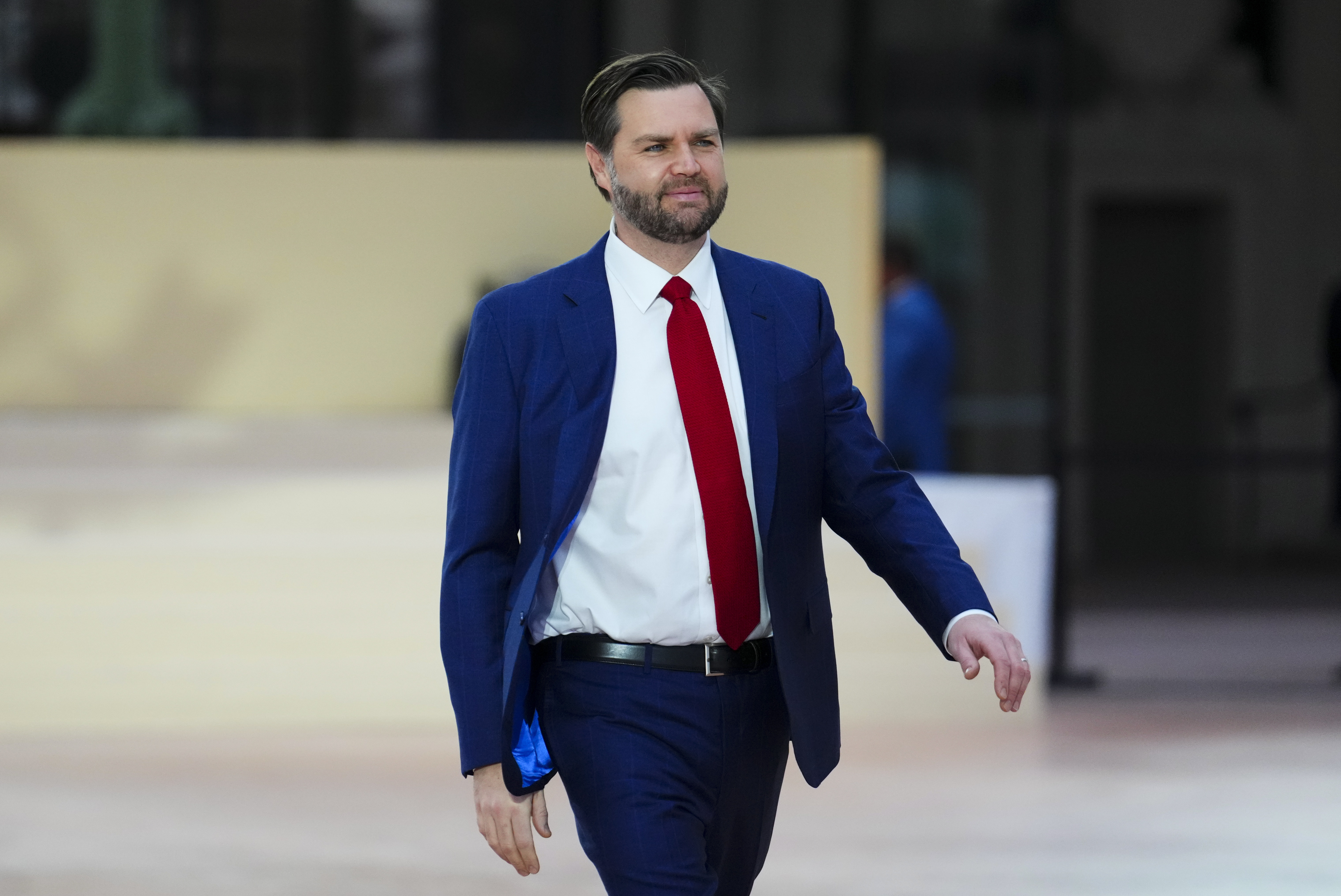
Speech by US Vice President Vance at the Munich Conference.
Following it, the European Union erupted in hysteria, and Steinmeier called on his "colleagues" not to be "deer in headlights", hinting at the prostration into which the European establishment fell after Vance's revelations.
(Video at link.)
The most notable personal appearance in Munich since Putin's famous speech in 2007.
https://colonelcassad.livejournal.com/9671222.html
Now there are more of them
February 15, 11:26

Stages of the long journey of "Operation Y". The first photo of "Geranium" of the Y series, number 004. 2022.

And this is a fragment of the "Geranium" of the Y series in early February 2025. Almost 15.5 thousand "Geraniums" have already been produced. And their number is increasing.
https://colonelcassad.livejournal.com/9671488.html
Ukrainian Air Defense Shot Down F-16 with Patriot SAM
February 15, 13:29

American media have confirmed that in 2024, "air defense titans" shot down an American F-16 fighter jet using a Patriot air defense system.
This information was previously reported by Russian sources and confirmed by some Ukrainian ones. Now, American media have confirmed it.
Thus, the first F-16 in this war was shot down by Ukrainian air defense.
https://colonelcassad.livejournal.com/9671741.html
Mother took revenge on the cannibals
February 15, 15:12

In Nikolaev, a woman blew up man-catchers. Presumably because the man-catchers caught her son and sent him to the front by force, where he died.
She died herself and killed one man-catcher. Another 8 were injured to varying degrees of severity.
(Video at link.)
It was inevitable that sooner or later the man-catchers would be killed. This explosion and the recent explosions of man-catchers in Rivne are only the beginning.
https://colonelcassad.livejournal.com/9671936.html


